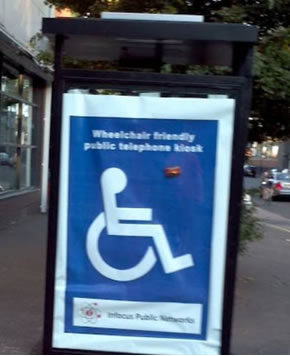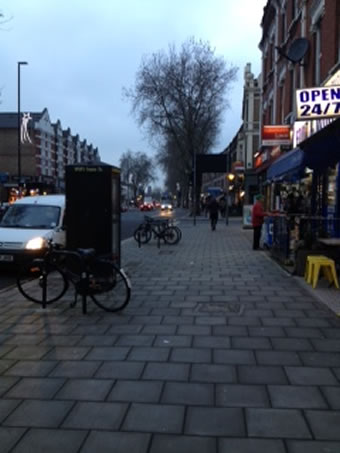Solar Powered Phone Box 'Not Just' For Making Calls
Wheel-chair friendly phone boxes have been criticised as 'advertising hoardings'
|
A bid has been made to Hounslow Council by a telephone company to install three solar-powered public phone boxes on Chiswick High Road.
The phone boxes, which are wheelchair accessible, have been rejected by a number of local authorities, and critics say they are more concerned with making money from advertising than being for public benefit.
The Warwickshire-based company, Infocus Public Networks Ltd, has applied for 'prior approval' to site the phone boxes on the pavement at 120, 96, 135 Chiswick High Road (outside Insider Dealings Interior Design , Sainsbury Local, and the former Ballet Rambert) . The applications are for 'prior approval' and not planning permission as this is not required by electrocommunications companies.
 0
0
An example of the type of phone box proposed
Local authorities, including Hammersmith & Fulham, Kensington & Chelsea, and Westminster have all said 'No' to the kiosks on grounds of siting and appearance- the only grounds on which a local authority can refuse 'prior approval'. Councils are not allowed to consider any advertising benefits which may accrue from the phone boxes as they are already the beneficiaries of 'deemed consent' from the regulatory body Ofcom.
Infocus, which describes itself as the UK's third public payphone operator, has challenged a number of local authorities for refusing to allow the phone boxes in their area. An attempt by the company to install fifteen phone boxes in Swindon, which was turned down by Wiltshire council, was partly overturned by the Planning Inspector who ruled that nine phone boxes could be sited in the town streets.
The payphone kiosks use mobile telephony for connection to other networks and the company says there are no invasive pavement works involved. They say the large windows deter the use of the kiosks for antisocial and criminal activity, and that there is still a need for public payphones for tourists, and ethnic minorities and those in wheelchairs.
The old-style kiosks are not allowed to be installed because they do not comply with disability regulations from Ofcom. BT has also removed hundreds of kiosks from UK streets due to the growth of mobile phone use.

The new style phone box would replace this one
Wiltshire Council has asked the government to give local authorities greater powers over the control of advertising on public payphones, following the Inspector's reversal of its decision, according to the Swindon Advertiser. The City of London also lost its attempt, on appeal, to prevent seven similar boxes in the Lambeth area.
Critics of the scheme say the phone boxes are a lucrative method of attracting commercial advertising to the company which installs them, and are not of any public benefit to disabled users as they take up more pavement surface than traditional kiosks and add to 'street clutter'..
Installation of electronic communications apparatus comes under the Town and County Planning (General Permitted Development Order), 1995, which automatically bestows planning permission for public pay phones to certified companies. But before the phone kiosks can be installed on a pavement, 'prior approval' on grounds of siting and appearance is needed from the relevant local authority. There is automatic permission for advertising use on the phone-boxes, as 'deemed consent,' included when a company is given regulatory powers by Ofcom.
In recent years hundreds of phone boxes have fallen into disrepair or been vandalised and BT has removed from UK streets, as fewer people use them due to the growth of mobile phone use.
January 11, 2016